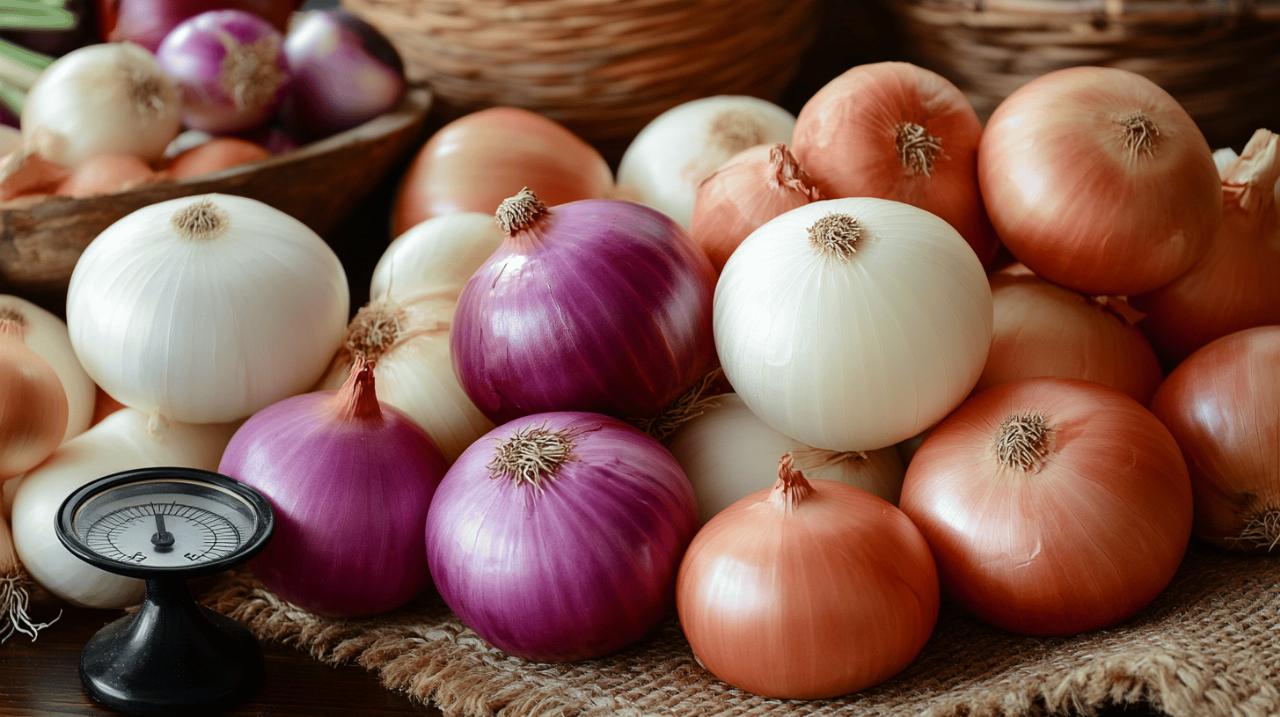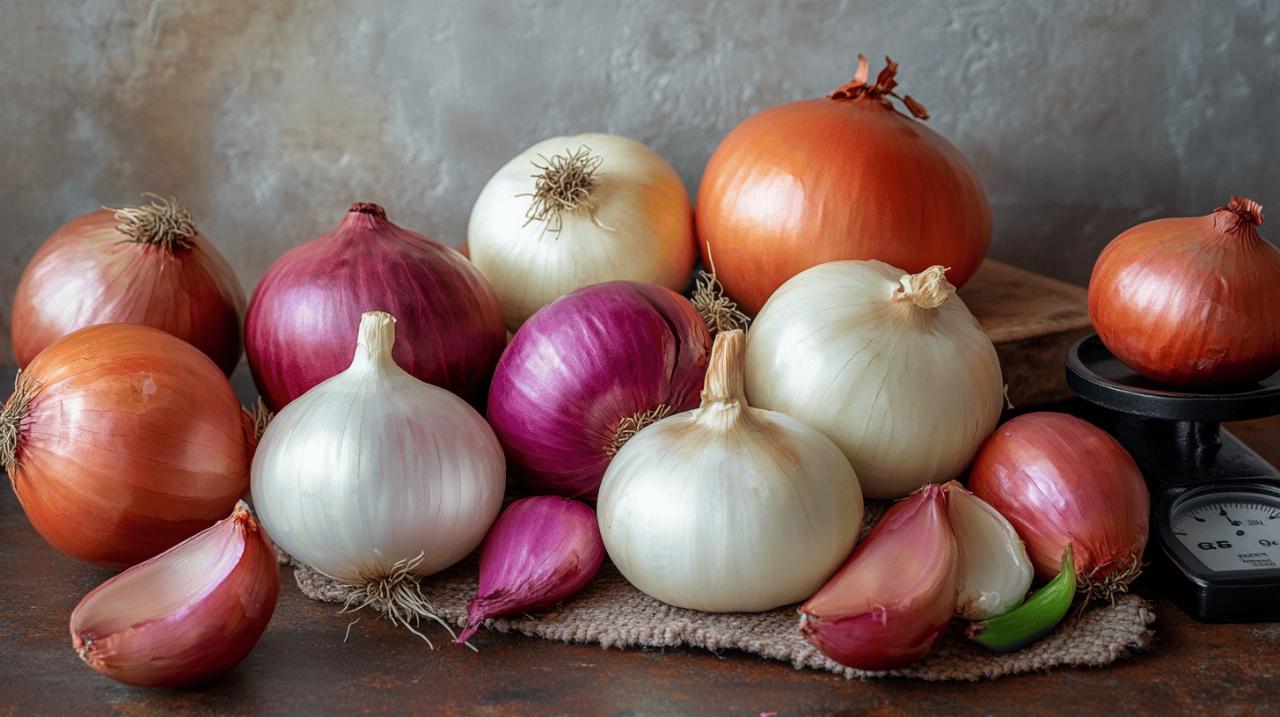Ah, belly fat – that stubborn, unwelcome guest that overstays its welcome around our midsections. In the endless quest for effective weight management solutions, onions have recently stepped into the spotlight. These humble kitchen staples, found in kitchens across Britain, are being examined for their potential to help trim that troublesome tummy bulge. But is there any truth to these claims, or is it just another food fad? Let's peel back the layers and examine what science actually tells us about onions and belly fat.
The Nutritional Profile of Onions and Weight Management
Onions might make you cry when chopping them, but your waistline might have reason to celebrate their presence in your diet. These flavoursome vegetables are surprisingly low in calories yet packed with nutrients that could support weight management goals. A medium-sized onion contains just about 45 calories while delivering a substantial nutritional punch, making it an excellent addition to meals for those watching their weight.
Fibre Content and Its Impact on Satiety
One of the most valuable contributions onions make to weight management is through their fibre content. A medium onion provides approximately 2 grams of dietary fibre, which might not sound impressive until you consider how this fibre functions in your body. The soluble fibre in onions forms a gel-like substance in your digestive tract, slowing digestion and helping you feel fuller for longer after meals. This increased satiety can naturally lead to reduced caloric intake throughout the day, supporting weight management efforts without leaving you feeling deprived.
Essential Vitamins and Minerals in Onions for Metabolic Health
Onions deliver a wealth of vitamins and minerals that support overall metabolic health. They contain vitamin C, B vitamins, potassium, and folate, all of which play various roles in energy metabolism and bodily functions related to weight management. These nutrients help optimise bodily processes that convert food into energy rather than storing it as fat. Furthermore, the chromium in onions assists with insulin regulation, potentially helping to stabilise blood sugar levels and reduce cravings that might otherwise lead to overeating.
Scientific evidence: onion compounds and fat metabolism
The weight management benefits of onion consumption extend beyond their basic nutritional profile. Scientific research has identified specific compounds in onions that may directly influence fat metabolism and storage in the body. Clinical trials examining these effects have yielded promising results that support onions' role in weight management strategies.
Quercetin and Its Effect on Fat Breakdown
Quercetin, a flavonoid abundantly found in onions, has emerged as a key player in the fight against excess body fat. Research from Japan discovered that this compound possesses anti-obesity properties that may specifically target visceral fat, the dangerous type that accumulates around internal organs. In one notable study, participants who consumed 9g of onion powder daily for 12 weeks experienced reduced visceral fat and improved liver function, particularly those with initially low levels of good cholesterol. The outer layers of onions contain the highest concentration of flavonoids like quercetin, suggesting that minimal peeling might preserve more of these beneficial compounds.
Sulphur Compounds and Their Role in Metabolic Processes
The distinctive aroma and flavour of onions come from their sulphur compounds, which do more than just add culinary appeal. These compounds appear to influence metabolic processes related to fat storage and energy expenditure. Research indicates that organosulfur compounds in onions may help increase the oxidation of fatty acids, essentially enhancing the body's ability to use fat as fuel. This metabolic shift could potentially contribute to reduced fat accumulation over time, especially when combined with other healthy lifestyle practices.
Onions and digestive health: the gut-belly fat connection
The relationship between gut health and weight management has become increasingly clear in recent years, with research suggesting that our digestive system plays a crucial role in how our bodies process and store fat. Onions offer several benefits that support digestive health, potentially creating conditions less favourable for belly fat accumulation.
Prebiotic properties and gut microbiome balance
Onions contain significant amounts of fructooligosaccharides, compounds that function as prebiotics in the digestive system. Unlike probiotics, which are beneficial bacteria themselves, prebiotics serve as food for the beneficial bacteria already residing in your gut. By nourishing these helpful microorganisms, onions help maintain a healthy balance in your gut microbiome. This balanced gut environment has been linked to improved metabolism and weight management, as certain beneficial bacteria species appear to influence how calories are extracted from food and how fat is stored in the body.
Reducing bloating and improving digestive transit
While not directly related to fat loss, the digestive benefits of onions can help reduce bloating and improve the appearance of your midsection. The sulphur compounds and fibre in onions support healthy digestive transit, helping food move through your system more efficiently. This improved digestive function can reduce the bloating and discomfort that sometimes mimic the appearance of belly fat. Regular onion consumption may help maintain this digestive efficiency, contributing to a flatter-looking tummy even as you work on reducing actual fat stores.
Incorporating Onions into a Balanced Diet for Optimal Results
 Despite their potential benefits for weight management, onions are not a magical solution for belly fat reduction. Their effectiveness depends largely on how they fit into your overall dietary pattern. Understanding the best ways to incorporate onions into your meals can help you maximise their potential benefits while maintaining a nutritionally balanced approach to eating.
Despite their potential benefits for weight management, onions are not a magical solution for belly fat reduction. Their effectiveness depends largely on how they fit into your overall dietary pattern. Understanding the best ways to incorporate onions into your meals can help you maximise their potential benefits while maintaining a nutritionally balanced approach to eating.
Recommended Portions and Frequency of Consumption
Research suggests that consistent, moderate onion consumption yields the best results for weight management. Studies showing positive effects typically involved daily intake, with one notable study using 9g of onion powder, roughly equivalent to about half a medium onion. For fresh onions, adding half to one medium onion to your daily meals appears to be a reasonable target. This amount is sufficient to provide beneficial compounds without overwhelming your palate or digestive system. Consistency appears to be key, as the metabolic effects of onion compounds may build over time, with research showing meaningful results after 12 weeks of regular consumption.
Red onions vs other varieties: which offers more benefits?
While all onion varieties offer health benefits, red onions may have a slight edge when it comes to compounds that support weight management. Red onions contain higher levels of quercetin and anthocyanins, powerful antioxidants that may enhance fat metabolism. These colourful onions also tend to have a milder, slightly sweeter flavour that makes them versatile for raw applications like salads, where their beneficial compounds remain intact. That said, yellow and white onions still offer significant benefits and can be incorporated into cooked dishes where their stronger flavours complement the cooking method. The best approach might be to enjoy a variety of onion types throughout your week, maximising the range of beneficial compounds you consume.
Clinical Research on Onions and Visceral Fat Reduction
Onions might be more than just a tasty addition to your meals – research suggests they could play a role in reducing belly fat. Recent nutritional research has examined the link between onion consumption and weight loss, with particular focus on their impact on visceral fat – the dangerous fat that surrounds internal organs. Several clinical trials have produced promising results, showing that compounds found in onions may support obesity management through multiple mechanisms.
Studies on Onion Peel Extract (OPE) and Waist Circumference
A 12-week Korean study investigating Onion Peel Extract (OPE) demonstrated notable benefits for overweight and obese participants. Those taking OPE capsules containing 100mg of quercetin daily experienced a more significant reduction in waist circumference compared to the placebo group. The OPE group's waist measurement decreased by 2cm (from 91.9cm to 89.9cm), while the control group saw only a 0.7cm reduction. Similarly, hip circumference in the OPE group decreased by 1.3cm versus 0.8cm in the control group. The extract used in this study was rich in beneficial compounds, containing 681.7 mg/g of total phenol, 372.0 mg/g of total flavonoid, and 286.0 mg/g of quercetin.
Skinfold thickness measurements also revealed promising results, with the OPE group showing a 3.2mm reduction compared to 2.2mm in the control group. These findings suggest that the flavonoid quercetin, abundant in onion peels, might target abdominal fat specifically. A Japanese study reached similar conclusions, finding that participants consuming just 9g of onion powder daily for 12 weeks experienced reductions in visceral fat, particularly among those with low levels of good cholesterol.
BMI Reduction and Metabolic Health Improvements from Regular Onion Consumption
Beyond waist circumference reduction, research indicates broader metabolic benefits from onion intake. A comprehensive analysis of 38 studies, narrowed down to 5 key clinical trials, found that regular onion consumption was associated with modest but meaningful improvements in several body composition markers. Participants experienced an average body weight reduction of 0.74kg, BMI decrease of 0.28 kg/m², body fat percentage reduction of 0.44%, and triglyceride level reduction of 14.18 mg/dL.
Metabolic health improvements extend to energy expenditure as well. Both the OPE and control groups in the Korean study showed increased resting energy expenditure (REE), with the control group's REE rising by 85.8 kcal (from 1,444.1 to 1,524.5 kcal) and the OPE group's increasing by 85.0 kcal (from 1,417.2 to 1,498.9 kcal). The OPE group also demonstrated an increase in respiratory quotient, suggesting altered metabolic function. Liver function improvements were noted in studies as well, particularly among participants taking onion supplements regularly.
While these findings are promising, it's worth noting that onions aren't a miracle weight loss solution. Their effects appear modest but potentially valuable as part of a comprehensive dietary intervention focusing on balanced nutrition, adequate fibre intake, and appropriate energy balance. For those looking to manage weight effectively, incorporating onions into a Mediterranean-style diet rich in fruits, vegetables, and lean proteins would likely yield the best results.





